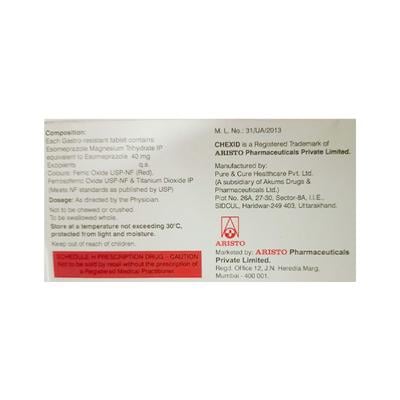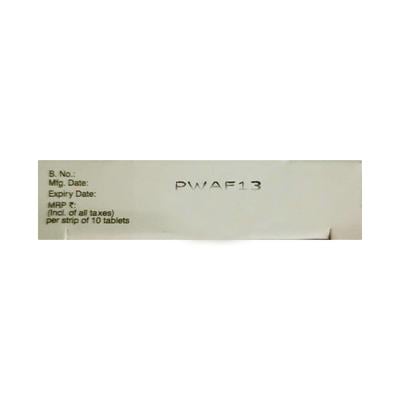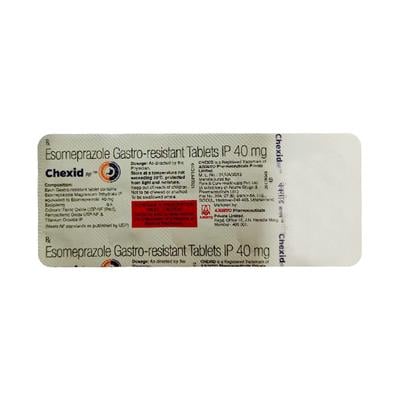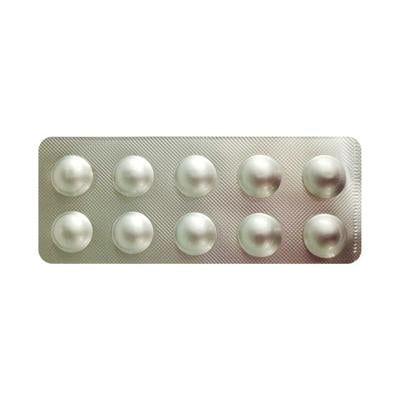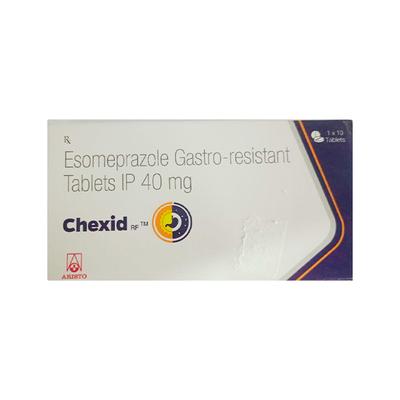

Netmeds First Membership
Quick Links
Introduction About CHEXID RF TABLET
CHEXID RF TABLET, containing esomeprazole, is widely chosen by individuals seeking relief from persistent acidity, heartburn, and acid reflux symptoms. It is especially useful for those experiencing discomfort due to gastroesophageal reflux disease (GERD), peptic ulcers, erosive esophagitis, or conditions involving excessive stomach acid production such as Zollinger-Ellison syndrome. By blocking the proton pumps in the stomach lining, esomeprazole effectively reduces acid secretion, promoting healing of the stomach and esophageal lining and improving overall digestive comfort.
This tablet is ideal for adults and can also be considered for use in elderly patients, pregnant or breastfeeding women, and those with kidney or liver conditions, though it should only be used under medical supervision in these groups. CHEXID RF TABLET is generally taken once daily, preferably before meals, and should be swallowed whole with water—crushing or chewing the tablet is not recommended for optimal absorption. Consistency in timing and adherence to the prescribed duration are important for achieving the best results.
Patients are advised to inform their healthcare provider about any existing allergies, liver problems, or plans for pregnancy or breastfeeding before starting CHEXID RF TABLET. It is important to avoid alcohol and certain foods that may worsen acidity, and to be cautious about potential interactions with other medications such as blood thinners, antifungals, and anti-HIV drugs. Prolonged use may lead to deficiencies in vitamin B12, calcium, or magnesium, and may increase the risk of bone thinning (osteoporosis). If you experience symptoms like severe stomach pain, black stools, or allergic reactions, immediate medical attention is necessary.
During pregnancy and breastfeeding, CHEXID RF TABLET may be used if clearly needed and prescribed by a doctor, as current evidence suggests safety but emphasizes the importance of medical guidance. Common side effects include headache, nausea, abdominal pain, diarrhea, constipation, dizziness, and flatulence. Most side effects are mild and temporary, but any persistent or severe symptoms should be reported to your healthcare provider.
Uses Of CHEXID RF TABLET
- Gastroesophageal reflux disease (GERD)
- Acid reflux and chronic acidity
- Peptic ulcer disease (stomach and duodenal ulcers)
- Erosive esophagitis (inflammation of the food pipe)
- Zollinger-Ellison syndrome (a condition with excessive stomach acid production)
- Indigestion and heartburn
- Relief from symptoms like stomach pain and discomfort related to acid-related disorders
Benefits of CHEXID RF TABLET
CHEXID RF TABLET for acid reflux
CHEXID RF TABLET is commonly chosen by individuals experiencing acid reflux, a condition where stomach acid flows back into the food pipe, causing discomfort and a burning sensation. By reducing the production of stomach acid, CHEXID RF TABLET helps relieve symptoms such as regurgitation and irritation in the esophagus. For best results, it is recommended to take the tablet about 1 hour before a meal, preferably in the morning, as advised by your healthcare provider
CHEXID RF TABLET for peptic ulcer
Peptic ulcers, which are sores in the lining of the stomach or upper intestine, can cause pain and digestive disturbances. CHEXID RF TABLET supports the healing process by lowering stomach acid levels, thereby reducing further irritation and allowing the ulcer to recover. It is important to follow your doctor’s instructions regarding dosage and duration to achieve optimal benefits and minimize the risk of recurrence
CHEXID RF TABLET for GERD
Gastroesophageal reflux disease (GERD) is a chronic condition marked by frequent acid reflux episodes. CHEXID RF TABLET is effective in managing GERD by controlling excess acid production, which helps in reducing symptoms like persistent heartburn, chest discomfort, and sour taste in the mouth. Regular use as directed can promote healing of the esophagus and improve overall digestive comfort
CHEXID RF TABLET for heartburn
Heartburn, characterized by a burning sensation in the chest or throat, is often triggered by excess stomach acid. CHEXID RF TABLET works by blocking the proton pumps responsible for acid secretion, providing quick and sustained relief from heartburn. To maximize effectiveness, avoid common triggers such as spicy foods, caffeine, and late-night meals, and take the medication as prescribed
How CHEXID RF TABLET Works
How Does CHEXID RF TABLET Reduce Stomach Acid
CHEXID RF TABLET contains esomeprazole, a proton pump inhibitor (PPI) that effectively lowers stomach acid production. It works by blocking the H+/K+ ATPase enzyme, also known as the gastric proton pump, located in the stomach lining. This enzyme is responsible for the final step in the secretion of gastric acid. By inhibiting this pump, CHEXID RF TABLET significantly reduces both basal and stimulated acid secretion, providing long-lasting acid suppression and promoting the healing of acid-related conditions
CHEXID RF TABLET action in acid reflux
In acid reflux, stomach acid flows back into the esophagus, causing symptoms like heartburn and discomfort. CHEXID RF TABLET helps manage these symptoms by decreasing the amount of acid produced in the stomach. This reduction in acid not only relieves the burning sensation but also helps protect the esophageal lining from further irritation and damage. The tablet is usually taken before meals for optimal effectiveness, as recommended by healthcare professionals
CHEXID RF TABLET mode of action in peptic ulcer
Peptic ulcers develop when the stomach lining is damaged by excess acid. CHEXID RF TABLET aids in the healing process by suppressing gastric acid secretion through inhibition of the proton pump. With lower acid levels, the ulcerated tissue is given a better environment to recover, reducing pain and the risk of complications. Regular use as directed by a healthcare provider supports ulcer healing and helps prevent recurrence
How to use CHEXID RF TABLET
CHEXID RF TABLET dosage and administration
- Usual adult dose is 40 mg once daily
- For GERD or erosive esophagitis, take 40 mg once daily for 4 weeks; may extend for another 4 weeks if needed
- Always take as prescribed by your doctor
- In severe liver impairment, do not exceed 20 mg per day
- No dose adjustment needed for elderly
- For children 12 years and older, 40 mg once daily for GERD (as advised by doctor)
CHEXID RF TABLET: How and When to Take
- Take on an empty stomach, at least 1 hour before a meal
- Preferably take in the morning for best results
- Swallow the tablet whole with a glass of water; do not crush or chew
- Take at the same time each day for consistent results
- If unable to swallow, disperse the tablet in half a glass of non-carbonated water, stir, drink immediately, then rinse and drink again
- Continue the full course as prescribed, even if symptoms improve
- Consult your doctor before stopping or changing your dose
What if I forgot to take CHEXID RF TABLET
If you forget to take CHEXID RF TABLET, take the missed dose as soon as you remember. However, if it is almost time for your next scheduled dose, simply skip the missed dose and continue with your regular dosing schedule. Do not take a double dose to make up for the missed one. If you are unsure about what to do, it is always best to consult your doctor or pharmacist for advice.
Overdose
In the event of an overdose of CHEXID RF TABLET, seek immediate medical attention. Overdosage may cause symptoms such as severe stomach pain, vomiting, dizziness, or irregular heartbeat. Do not attempt to treat an overdose on your own. Contact emergency services or go to the nearest hospital right away, and if possible, bring the medication packaging or container with you to assist healthcare providers in giving you the appropriate treatment.
Side Effects Of CHEXID RF TABLET
Common side effects of CHEXID RF TABLET
- headache
- diarrhoea
- stomach pain
- constipation
- flatulence
- nausea, vomiting
- benign polyps in the stomach (masses of cells that form on the lining inside your stomach)
When to Seek Medical Attention?
Stop taking CHEXID RF TABLET and consult your doctor immediately if you experience any of the following side effects:
- sudden wheezing, swelling of lips, tongue and throat or body, rashes, fainting or difficulty in swallowing (severe allergic reaction)
- reddening of the skin with blisters or peeling in the lips, eyes, mouth, nose and genitals indicative of Stevens-Johnson syndrome or toxic epidermal necrolysis
- yellow skin, dark-coloured urine and tiredness (liver problems)
- fever with a severely reduced general condition or fever with symptoms of a local infection such as pain in the neck, throat or mouth or difficulties in urinating
How To Manage Side Effects
Nausea And Vomiting
- Ginger: Known for its anti-nausea properties, ginger tea or ginger supplements can soothe an upset stomach
- Small, Frequent Meals: Eating smaller meals more frequently throughout the day can manage nausea. Avoid large or greasy meals
- Stay Upright: After eating, avoid lying down, as this can worsen nausea
- Fresh Air: Sometimes, stepping outside for fresh air can help relieve the sensation of nausea
Warning & Precautions
Pregnancy
Monitoring requiredCHEXID RF TABLET should be used during pregnancy only if considered clearly necessary. Consult your doctor before taking CHEXID RF TABLET.
Breastfeeding
ContraindicatedCHEXID RF TABLET is not recommended for use in breast feeding women as it is unclear whether it passes through the breast milk. Consult your doctor before taking CHEXID RF TABLET.
Driving and Using Machines
Use with CautionDo not drive or operate any heavy tools or machines if you experience dizziness and blurred vision after taking CHEXID RF TABLET. Consult your doctor before taking CHEXID RF TABLET.
Alcohol
Consult your doctorAvoid or limit the consumption of alcohol while taking CHEXID RF TABLET because it might increase the amount of acid in your stomach than normal which can irritate your stomach lining and worsen your symptoms.
Kidney
Use with CautionCHEXID RF TABLET should be used with caution in patients with severe kidney problems. Consult your doctor before taking CHEXID RF TABLET.
Liver
Use with CautionCHEXID RF TABLET should be used with caution in patients with severe liver problems. Consult your doctor before taking CHEXID RF TABLET.
Allergy
ContraindicatedDo not take CHEXID RF TABLET if you are allergic to Esomeprazole or to any ingredients of this medicine.
Use In Pediatrics
ContraindicatedCHEXID RF TABLET is not recommended for use in children and adolescents below 12 years of age. Your doctor will prescribe the right dose depends on your child’s age, body weight and disease condition. Consult your doctor before taking CHEXID RF TABLET.
Use In Geriatrics
Use with CautionCHEXID RF TABLET should be taken with caution in elderly patients (65 years and above). Consult your doctor before taking CHEXID RF TABLET.
Other Warnings for CHEXID RF TABLET
Before taking CHEXID RF TABLET, inform your doctor if you:
- have or ever had a skin reaction after taking medicine to manage acidity
- are going to have a specific blood test (Chromogranin A)
- are losing a lot of weight without reason
- have problems swallowing, stomach pain or indigestion
- pass black stools (blood-stained faeces)
- have skin rashes especially after getting exposed in sun
- have joint pain
Safety Advice
- Take as Prescribed: Always take CHEXID RF TABLET in the exact dose and duration prescribed by your doctor. Do not stop the medication abruptly, even if your symptoms improve, unless advised by your doctor.
- Timing: Take the tablet on an empty stomach, preferably in the morning or at least one hour before a meal, for best absorption and effectiveness.
- Long-Term Use: Prolonged use may increase the risk of side effects such as bone fractures, vitamin B12 deficiency, and low magnesium or calcium levels. Your doctor may recommend regular blood tests to monitor these levels if you need long-term treatment.
- Inform Your Doctor: Tell your doctor if you have a history of liver problems, gastric cancer, osteoporosis, or allergies to proton pump inhibitors. Also, inform them about all other medications you are taking, as CHEXID RF TABLET can interact with drugs like blood thinners, antifungals, anti-HIV medicines, and iron supplements.
- Avoid Alcohol and Smoking: Alcohol and smoking can worsen acidity and reduce the effectiveness of CHEXID RF TABLET. Limit or avoid these to help manage your symptoms better.
- Watch for Serious Symptoms: Seek immediate medical attention if you experience severe allergic reactions, persistent diarrhea, unexplained weight loss, frequent vomiting, difficulty swallowing, or blood in vomit or stool, as these may indicate serious conditions.
- Lifestyle Modifications: Along with medication, follow lifestyle changes such as avoiding spicy, fatty foods, caffeinated drinks, and carbonated beverages to enhance treatment effectiveness.
Always consult your doctor for personalized safety advice and before making any changes to your medication or lifestyle while using CHEXID RF TABLET.
Diet and Lifestyle Advice
- Take on an Empty Stomach:
CHEXID RF TABLET should be taken at least one hour before a meal, preferably in the morning. This allows for optimal absorption and effectiveness. - Eat Simple Meals:
Stick to light, simple meals. Avoid rich, spicy, and fatty foods, as these can trigger or worsen symptoms of acidity and indigestion. - Limit Certain Beverages:
Reduce or avoid carbonated drinks, citrus juices, caffeinated beverages (such as tea, coffee, and cola), and alcohol. These can increase stomach acid production and may aggravate your symptoms. - Stay Hydrated:
Drink plenty of water throughout the day. Adequate hydration supports digestion and helps prevent dehydration, especially if you experience side effects like diarrhea or vomiting. - Avoid Late-Night Eating:
Refrain from eating large meals late at night or just before going to bed. This helps reduce the risk of nighttime acid reflux. - Eat Smaller, Frequent Meals:
Instead of large meals, have smaller, more frequent meals to minimize stomach distension and acid production. - Maintain a Healthy Weight:
Excess weight can put pressure on your stomach and increase acid reflux. Aim for a balanced diet and regular physical activity to support a healthy weight. - Elevate Your Head While Sleeping:
If you experience nighttime heartburn, try elevating the head of your bed or using extra pillows to help prevent acid from flowing back into the esophagus. - Manage Stress:
Practice stress-reducing techniques such as deep breathing, meditation, or gentle exercise, as stress can worsen digestive symptoms. - Avoid Smoking:
Smoking can increase stomach acid and delay healing. If you smoke, seek support to quit.
Drug - Drug interaction
CHEXID RF TABLET (esomeprazole) is a proton pump inhibitor commonly used to manage gastric acid-related conditions. Like many medications, it can interact with other drugs, potentially affecting how it or the other medicines work. Understanding these interactions helps ensure safe and effective use.
1. Antifungals (Ketoconazole, Itraconazole)
- Interaction: CHEXID RF TABLET can reduce the absorption and effectiveness of certain antifungal medicines that require an acidic stomach environment.
- Management: Your doctor may adjust the timing of doses or recommend alternative antifungal agents if necessary.
2. HIV Medications (Atazanavir, Nelfinavir)
- Interaction: The acid-reducing effect of CHEXID RF TABLET can decrease the absorption of some anti-HIV drugs, lowering their effectiveness.
- Management: These combinations are generally avoided. If necessary, your doctor may adjust therapy or monitor your response closely.
3. Anticoagulants (Warfarin)
- Interaction: Esomeprazole may slightly increase the blood levels of warfarin, potentially affecting blood clotting.
- Management: If you use warfarin, your doctor may monitor your INR (a blood clotting test) more frequently and adjust the warfarin dose as needed.
4. Anticancer Drug (Methotrexate)
- Interaction: High doses of methotrexate may have increased blood levels when used with CHEXID RF TABLET, raising the risk of toxicity.
- Management: Your doctor may consider temporarily stopping CHEXID RF TABLET or closely monitoring methotrexate levels during high-dose therapy.
5. Antiepileptic (Phenytoin)
- Interaction: CHEXID RF TABLET can increase phenytoin levels in the blood.
- Management: Blood levels of phenytoin may be monitored, and dose adjustments made if necessary.
6. Antiplatelet Agent (Clopidogrel)
- Interaction: Esomeprazole can reduce the effectiveness of clopidogrel by affecting its conversion to the active form.
- Management: Your doctor may consider alternative acid-reducing agents or closely monitor your cardiovascular health.
7. Antibiotics (Ampicillin) and Iron Supplements
- Interaction: The reduced stomach acidity from CHEXID RF TABLET can decrease the absorption of oral ampicillin and iron supplements.
- Management: Your doctor may adjust the timing of administration or recommend alternative options.
8. Diazepam
- Interaction: Esomeprazole can slow the breakdown of diazepam, potentially increasing its effects.
- Management: Your doctor may monitor for increased sedation or adjust the diazepam dose if needed.
9. Digoxin
- Interaction: CHEXID RF TABLET may slightly increase digoxin absorption, which could raise the risk of digoxin toxicity.
- Management: Monitoring digoxin blood levels and clinical symptoms is recommended.
Drug - Food interaction
CHEXID RF TABLET should be taken on an empty stomach, ideally at least one hour before a meal, as food can interfere with its absorption and reduce its effectiveness. Certain dietary habits and food choices may also impact gastric acid levels and the way you experience symptoms while using this medication.
1. Spicy, Fatty, and Rich Foods
- Interaction: Foods high in fat, spice or richness can stimulate stomach acid production and worsen symptoms such as heartburn or indigestion.
- Management: Limit or avoid spicy, fatty, and rich foods to help maintain symptom control and support the action of CHEXID RF TABLET.
2. Caffeinated Beverages (Tea, Coffee, Cola)
- Interaction: Caffeine can increase gastric acid secretion, potentially counteracting the acid-reducing effect of CHEXID RF TABLET.
- Management: Reduce intake of caffeinated drinks to help minimize stomach discomfort and enhance the benefits of your medication.
3. Carbonated Beverages and Citrus Juices
- Interaction: Carbonated drinks and citrus juices (such as orange or lemon juice) can irritate the stomach lining and increase acid production, possibly aggravating symptoms.
- Management: Avoid or limit carbonated beverages and citrus juices to support better gastric comfort while using CHEXID RF TABLET.
4. Alcohol
- Interaction: While alcohol does not directly interact with CHEXID RF TABLET, it can stimulate more acid production in the stomach and worsen symptoms.
- Management: Limit or avoid alcohol consumption to reduce the risk of increased stomach acidity and irritation.
Synopsis
|
Drug |
: |
Esomeprazole |
|
Pharmacological Category |
: |
Proton Pump Inhibitors |
|
Therapeutic Indication |
: |
Gastroesophageal reflux disease (GERD), Stomach ulcers, Intestinal ulcers, Zollinger-Ellison Syndrome |
|
Dosage Forms |
: |
Tablet, Capsule, Injection, Infusion, Sachet, Granules |
More Information
CHEXID RF TABLET vs. Nexpro RD 40 Capsule
|
Feature |
CHEXID RF TABLET |
Nexpro RD 40 Capsule |
|
Composition |
Esomeprazole 40 mg |
Esomeprazole 40 mg + Domperidone 30 mg |
|
Form |
Tablet |
Capsule (sustained-release) |
|
Type of Drug |
Proton Pump Inhibitor (PPI) |
Combination: PPI + Prokinetic agent |
|
Primary Use |
Acid reflux, GERD, peptic ulcers |
Acid reflux with symptoms like nausea, bloating, and vomiting |
|
Additional Action |
Reduces stomach acid production |
Reduces acid + promotes gastric motility |
|
Domperidone Content |
No |
Yes (used to relieve nausea and improve stomach emptying) |
|
Dosage Timing |
Usually taken before meals |
Usually taken 15–30 minutes before meals |
|
Onset of Action |
Within 1–2 hours |
Slightly faster due to added prokinetic (Domperidone) |
|
Prescribed For |
Simple GERD, ulcers, and acid-related disorders |
GERD with delayed gastric emptying, nausea, and bloating |
|
Common Side Effects |
Headache, diarrhea, flatulence |
Dry mouth, dizziness, headache, diarrhea, abdominal cramps |
|
Prescription Requirement |
Yes |
Yes |
Is CHEXID RF TABLET More Effective Than H2 Blockers for GERD?
CHEXID RF TABLET (esomeprazole) is generally considered more effective than H2 blockers (H2-receptor antagonists) for treating GERD. Proton pump inhibitors like CHEXID RF TABLET suppress stomach acid more profoundly and for a longer duration than H2 blockers. Clinical studies show that PPIs provide symptomatic relief in about 83% of GERD patients, compared to 60% with H2 blockers. Additionally, healing rates for esophagitis are significantly higher with PPIs—about 78% versus 50% with H2 blockers. This greater efficacy is because PPIs block the final step of acid production, while H2 blockers only partially reduce acid and are less effective, especially after meals. For most patients with moderate to severe GERD, CHEXID RF TABLET is preferred for both symptom control and healing of the esophagus.
FAQs About CHEXID RF TABLET
Q: What is CHEXID RF TABLET used for?
A: CHEXID RF TABLET contains esomeprazole, a proton pump inhibitor that reduces the amount of acid produced in the stomach. It is commonly used to treat acid-related conditions such as GERD, peptic ulcers, and Zollinger-Ellison syndrome. By lowering stomach acid, it helps relieve symptoms like heartburn and indigestion and promotes healing of the stomach lining.
Q: What are the main uses of CHEXID RF TABLET?
A: CHEXID RF TABLET is primarily prescribed for treating gastroesophageal reflux disease (GERD), peptic ulcers, and conditions with excessive stomach acid. It is also used to prevent ulcers caused by NSAIDs and as part of combination therapy for H. pylori infection.
Q: How should I take CHEXID RF TABLET?
A: Take CHEXID RF TABLET exactly as prescribed by your doctor, usually once daily before meals. Swallow the tablet whole with a glass of water—do not crush or chew it. Taking it at the same time each day helps maintain consistent acid control.
Q: Can CHEXID RF TABLET be taken on an empty stomach?
A: Yes, it is recommended to take CHEXID RF TABLET on an empty stomach, at least one hour before a meal. This ensures optimal absorption and effectiveness of the medication.
Q: Is CHEXID RF TABLET safe during pregnancy?
A: CHEXID RF TABLET should only be used during pregnancy if clearly needed and prescribed by your doctor. Discuss the potential risks and benefits with your healthcare provider before starting this medication during pregnancy.
Q: How long should I take CHEXID RF TABLET?
A: The duration of treatment depends on your specific condition and your doctor’s recommendations. Do not stop taking the medication suddenly without consulting your doctor, even if you feel better
Q: Can CHEXID RF TABLET help with stomach ulcers?
A: Yes, it helps heal and prevent stomach and duodenal ulcers by reducing acid production and allowing the lining to recover.
Q: What precautions should I take while using CHEXID RF TABLET?
A: Inform your doctor about any allergies, liver or kidney problems, or other medications you are taking. Avoid alcohol, smoking, and foods that trigger acidity for best results
Q: Are there any foods or drinks I should avoid?
A: Avoid spicy foods, caffeine, alcohol, and carbonated beverages, as these can worsen acidity and reduce the effectiveness of the medication.
Q: Does CHEXID RF TABLET affect bone health?
A: Long-term use may increase the risk of bone fractures, especially in the hip, wrist, or spine. Your doctor may recommend supplements or regular monitoring if you require prolonged therapy.
Q: Can I stop taking CHEXID RF TABLET suddenly?
A: Do not stop taking CHEXID RF TABLET abruptly without your doctor’s advice, as symptoms may return or worsen. Always follow your doctor’s instructions for tapering or discontinuing the medication
Q: Is CHEXID RF TABLET safe for elderly patients?
A: CHEXID RF TABLET can be used in elderly patients, but they may be at higher risk for side effects like bone fractures and deficiencies. Regular monitoring by a doctor is recommended.
Q: Can CHEXID RF TABLET be used to prevent NSAID-induced ulcers?
A: Yes, CHEXID RF TABLET is effective in preventing ulcers caused by NSAIDs in patients who require long-term pain relief medications.
Q: Can CHEXID RF TABLET be used for H. pylori infection?
A: CHEXID RF TABLET is often used as part of a combination therapy with antibiotics to eradicate H. pylori infection, which causes peptic ulcers. Follow your doctor’s instructions for the full regimen.
Q: Can CHEXID RF TABLET be used for H. pylori infection?
A: CHEXID RF TABLET is often used as part of a combination therapy with antibiotics to eradicate H. pylori infection, which causes peptic ulcers. Follow your doctor’s instructions for the full regimen.
References
1. KD Tripathi. Drugs for Peptic Ulcer and G.E.R.D. Essentials of Medical Pharmacology. seventh edition. 2013. Page – 649, 653, 657.
2. Franke, Andreas, Caroline Hepp, Hermann Harder, Christoph Beglinger, and Manfred V. Singer. Esomeprazole reduces gastroesophageal reflux after beer consumption in healthy volunteers. Scandinavian journal of gastroenterology. NIH National Library of Medicines, National Library of Medicine. 2008. [Accessed on 1st September 2025] ![]()
3. Sun Pharmaceutical Industries Europe B.V. Electronic Medicines Compendium (EMC). [Revised in March 2021] [Accessed on 1st September 2025] 
4. Astra Zeneca Pharmaceuticals LP. U.S. Food & Drug Administration. [Revised in December 2014] [Accessed on 1st September 2025] 
5. AstraZeneca Pharmaceuticals (Ptd) Limited. [Revised in October 2020] [Accessed on 1st September 2025] 









